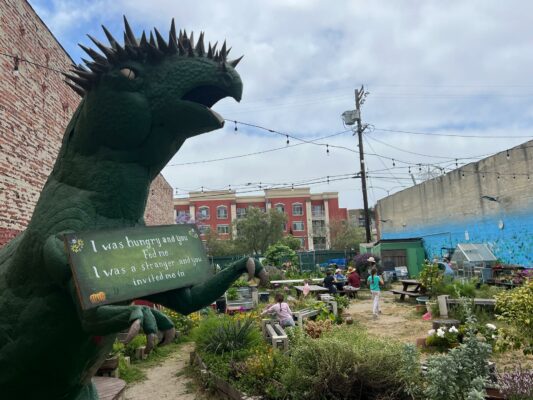
Although the terminus of Mark Rothko’s impassioned and tumultuous life is but presciently alluded to in John Logan’s pugilistic “Red,” the script resonates because of it. In 1958, Rothko accepted a large sum of money – $35,000 – to create a quartet of paintings for the posh Four Seasons restaurant atop New York City’s Seagram Building. By doing that, did he paint himself into a corner? “Red,” which stars Alfred Molina as Rothko and Jonathan Groff as his hired assistant, Ken, is an award-winning play onstage through Sept. 9 at the Mark Taper Forum.
To be an artist, as opposed to a mere decorator, which is what most painters are, is to step into the fire. It’s all about risk and uncertainty. So how did Rothko square with himself the fact that, stripped to its basics, this commission was to create decorative work? At first, I think, by being very cynical about it, and placing this cynicism between himself and the question of whether he was, to put it bluntly, selling out. Eventually — and this is one of the reasons why Ken is pivotal (as foil, as goad) — Rothko confronts his aesthetic morality and proceeds to be true to himself.
Let’s go back, or rather forward, to that terminus. In 1970, at the age of 66, Rothko sliced open his wrists and bled to death (the same year – did they have a secret pact? – of Japanese novelist Yukio Mishima’s spectacular suicide). A few months later, in Houston, the Rothko Chapel (as it’s been known since) opened its doors. This small, octagonal room – like a Catholic baptistery – houses a dozen dark, somber canvases. As Robert Rosenblum puts it, “Rothko’s paintings seek the sacred in a modern world of the secular.”

And so, twelve years earlier, that lure of greenbacks and the temptation to rake them all in, was an aberration all the more clear with hindsight.
In Logan’s script, Rothko is combative and bold, a roaring lion, and a person few of us would be willing to tolerate. He is also an aging roaring lion – musing over his contemporaries, Jackson Pollock in particular, Barnett Newman, Clyfford Still, Adolph Gottlieb – who avows that the artist must “kill” his predecessors but at the same time he fears being deposed, and disposed of, by the new generation of artists, of which, we imagine, Ken is one.
This is the inherent dynamic of “Red,” as conceived by Logan and executed brilliantly by Molina. The drama of this play – like the creative act itself – is in the push-pull of tension and passion, and visually best expressed when Rothko and Ken feverishly slather a large canvas with red paint. It is a physical and even lustful act, with both painters exhausted when they’re through.
Rothko’s work, large and prominent but dematerialized and luminous, contains elemental forces and presents us with a spatial mystery. Where do we stand? Close? Not so close? The aim of the work is to elicit an emotional resonance; again, to seek to embody the sacred in the secular by pushing us right up to the edge of the abyss.
What about the title? One day the black will swallow the red, Rothko says, which not only sounds prophetic but seems to imply that red is our life force, our blood, and when the red runs out then the black – in all its deathly connotations – shoves its way in. In the interim, while we thrive and pulsate, seeing red means sensing provocation and responding to it. Rothko saw red in his confrontation with the world, with the establishment, with commerce, with the art that preceded him, and he rushed forward to engage it with everything he had.
Red, directed by Michael Grandage, is onstage through Sept. 9 at the Mark Taper Forum, 135 N. Grand Ave., downtown Los Angeles in the Music Center. Performances, Tuesday through Friday at 8 p.m., Saturday at 2:30 and 8 p.m., and Sunday at 1 and 6:30 p.m. Tickets, $20 to $100. Call (213) 628-2772 or go to CenterTheatreGroup.org.










